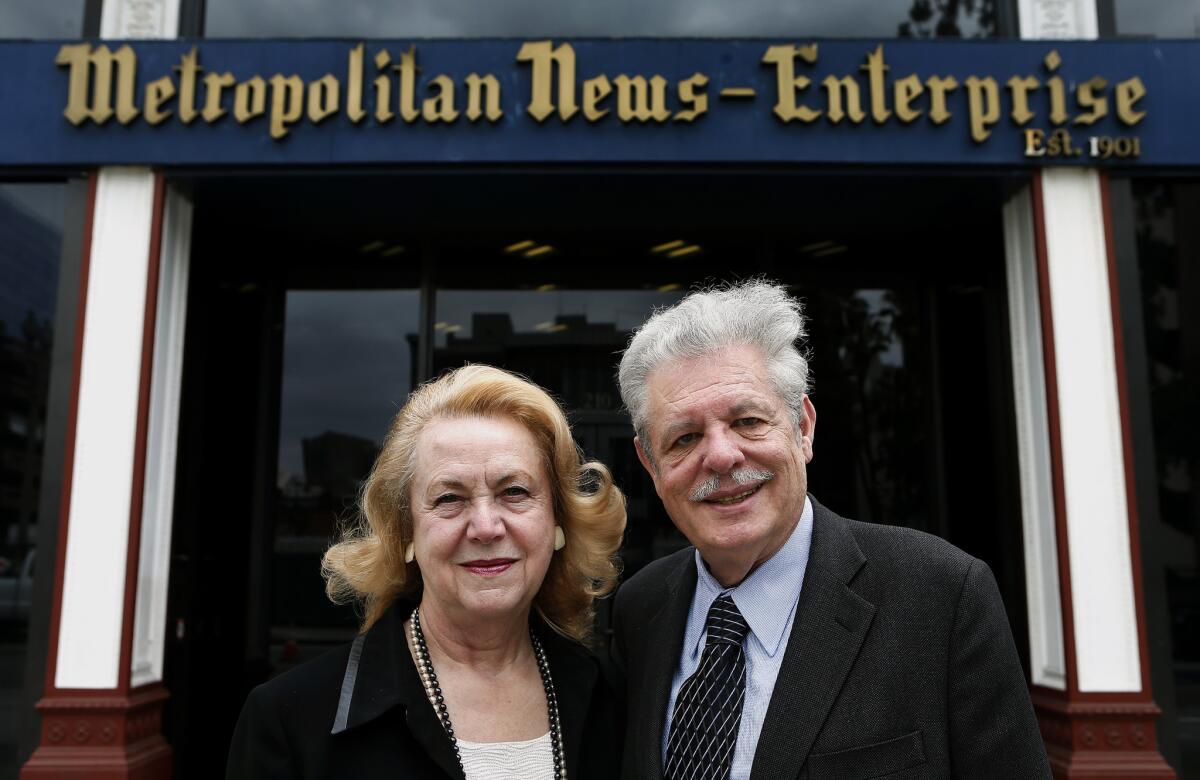Campaigning for a judge’s seat? A sexier title could get you elected — or sued

Every two years, candidates campaigning for judge in Los Angeles County follow the same trusted routine. Hang political signs. Vie for endorsements. And head to court to accuse rivals of lying about their ballot title.
Last election, judges ordered three attorneys to change their titles after rivals claimed they had misled voters.
This year’s campaign has again seen lawyers accused in court of stretching the truth. Among them is a deputy district attorney in the white-collar crimes unit, which prosecutes embezzlement and complex theft cases. The ballot designation she successfully defended? “Violent crimes prosecutor.”
Attempts to craft the loftiest or toughest-sounding ballot titles have triggered legal fights and accusations of deception that have become as much a part of judicial elections in L.A. County as posting political campaign signs — a dysfunctional reality that has spurred some legal experts to call for election reform.
See the most-read stories this hour >>
Since some voters fill in their ballots knowing nothing beyond the three-word job titles, candidates in many of California’s elections have a strong incentive to list the best possible descriptor.
As a result, the history of campaigns is full of examples of people fudging their job descriptions. In April, City Councilman Mitch Englander, a full-time politician who volunteers as a reserve cop, was ordered to stop calling himself “police officer” on the ballot in his bid for county supervisor.
But critics say attempts to inflate ballot titles are especially worrying when they involve lawyers campaigning for the bench, arguing that they undermine the public’s faith in the justice system.
“It’s very unsavory,” said former Dist. Atty. Steve Cooley, who took one of his GOP rivals to court over a ballot designation during his unsuccessful bid for attorney general in 2010. “They should be in the truth business. They’re gilding the lily.”
Political consultant David Gould, who is working on behalf of several attorneys running for judge this year, said the reason candidates use the tactic is simple: It works.
The sexier your title, the better your chance of getting elected
— Political consultant David Gould
“The sexier your title, the better your chance of getting elected,” said Gould, who has worked on judicial races for more than 15 years.
The titles are especially important in judicial races because the elections are nonpartisan and, he said, the candidates are among the least known on the ballot. The bloc of voters who cast ballots during June primaries — when many judges are elected — skews older and more conservative, Gould said, and accordingly has a tough-on-crime view that favors prosecutors over defense attorneys.
In 2012, a deputy district attorney was barred from running as a “violent crimes prosecutor,” after a competitor sued saying it was misleading because she only worked part-time and handled a handful of violent cases. A judge agreed. She ended up losing.
California’s election code states that, using three words or less and without misleading voters, ballot descriptions must describe a candidate’s “principal professions, vocations or occupations” in the past year.
While brainstorming potential designations for one of his clients in 2012, Gould conducted a makeshift poll of employees in his office.
“OK,” he asked them, “Who do you hate the most?”
People who hurt children, they answered, so the candidate ran as a “child molestation prosecutor,” and won.
Titles that convey cracking down on gangs are also popular. One of this year’s contentious races pits a “gang murder prosecutor” against a “gang homicide prosecutor,” a “violent crimes prosecutor,” and a “civil litigator.”
Deputy Dist. Atty. Javier Perez, who supervises the district attorney’s office in West Covina, tried to bill himself as a “supervising gang prosecutor,” saying that some of the cases prosecuted in the branch office involve gang-related crime. A challenger accused him of misleading the voters and a judge agreed. Now, he’s running in the June 7 election as a “supervising criminal prosecutor.”
Perez did not return calls for comment.
Facing an electorate looking to punish criminals, defense attorneys almost never describe themselves using their official titles, instead opting for more vague descriptions, such as, “attorney/counselor.”
See more of our top stories on Facebook >>
This year, county election officials blocked Deputy Public Defender Tami L. Warren from running as a “court appointed attorney,” saying that although she works for an agency that is appointed to defend the indigent, she isn’t personally appointed.
When Warren picked a new option — “violent crimes counsel” — the incumbent judge running against her sued, arguing that the title tricked voters into thinking the attorney prosecuted accused criminals when she really defends them.
But a judge allowed that title, saying that Warren, who declined to comment, wasn’t required to use the most specific description of her job.
Gould said elections favoring prosecutors create an imbalanced court. The simple fix, he said, would be to appoint all judges, instead of electing them. Judges face election every six years, though the governor can appoint a judge to fill a midterm vacancy.
L.A. County Superior Court Judge Randolph M. Hammock, who was elected in 2010 using “Superior Court referee” after losing in 2006 when using “consumer law attorney,” said he has noticed a slow, methodical change toward tougher-sounding ballot designations over the past 15 to 20 years.
“My prediction for next election,” Hammock said, “will be an ‘ISIS/terrorist prosecutor.’”
The problem, he said, is largely limited to L.A. County, where voters often don’t know judicial candidates’ actual jobs or their reputations because the county is so big.
Hammock, who serves on the judicial elections committee for the California Judges Assn., said the group is considering sponsoring legislation that would require candidates to use more precise, neutral job titles.
::
On a recent afternoon in a downtown office building a short walk from the county’s main criminal and civil courthouses, a husband-and-wife team who have done as much as anyone to expose judicial candidates stretching their ballot titles sipped Armenian coffee and shared stories about the ridiculousness of local judicial elections.
Roger and Jo-Ann Grace, who are both attorneys, laughed about the lawyer irreverently nicknamed “bagel lady” during a 2006 race for judge because she once owned a bakery and about all the candidate ballot fights — “brouhahas,” as Jo-Ann calls them — that they’ve seen over the years.
As editor of the Metropolitan News-Enterprise, which covers L.A.’s legal scene, Roger has written about the ins and outs of candidate ballot shenanigans for years. Last election cycle, he wrote an editorial condemning the practice of letting lawyers choose their own generic descriptions, saying it allowed for the use of an “inane and imprecise” title.
He said he doesn’t think anything will change without a legislative overhaul — it’s simply too tempting to exaggerate a ballot title.
Candidates either get away with their stretched designations and benefit from them or get forced to change them by a judge after a competitor sues, which still leaves them no worse off than if they’d never tried.
“There’s no accountability,” he said.
Jo-Ann shrugged.
“It’s really a fantasy-land with these designations,” she said. “It’s nuts.”
She has drafted proposed legislation that would require employees of governmental law offices to use only their official titles for ballot designations. “Deputy district attorney” and “deputy public defender,” for instance, instead of “child molestation prosecutor” or “violent crimes counsel.”
The proposal hasn’t gained much traction.
Los Angeles County Registrar-Recorder Dean Logan, whose office oversees elections, admits that there’s a certain amount of subjectivity in the ballot designation process.
The agency makes candidates fill out worksheets justifying their titles and occasionally questions a designation, Logan said, but county employees don’t scrutinize them closely because of time constraints and because the agency simply isn’t in the business of policing occupation titles.
That leaves the task of holding candidates accountable mainly in the hands of competitors who can sue the registrar to change their opponent’s ballot title, if they believe it’s misleading.
That’s what’s happened in one of the contentious races this year. Deputy Dist. Atty. Steven Schreiner went to court, hoping to force his colleague — Debra Archuleta of the D.A.’s white-collar crime division — to change her designation. Archuleta joined the unit two years ago, but listed herself as a “violent crimes prosecutor,” arguing that she still spends a majority of her time working on cases that rolled over from her last assignment in family violence, including retrying an attempted murder case.
Archuleta said she has taken on only a handful of white-collar cases in the past two years and dismissed as “ludicrous” Schreiner’s implication that she had intentionally dragged out the attempted murder case to justify her ballot designation.
She said she believed using “violent crimes prosecutor” gave voters the fullest picture of what she spent the past year doing.
A judge sided with Archuleta, ruling that her title didn’t mislead voters. But after the dispute, the local prosecutors union pulled its endorsement of her and backed Schreiner.
But Schreiner, who wanted to run as a “gang murder prosecutor,” had title trouble of his own.
After a challenger sued, a judge ordered Schreiner to make a one-word tweak. Now, he’s on the ballot as “gang homicide prosecutor” — the same title he used during his failed bid last election. In 2012, he lost to a deputy city attorney who ran as a “criminal gang prosecutor.”
Follow me on Twitter: @marisagerber
ALSO
L.A is projected to add a lot of low-paying jobs through 2020
Basketball court plan in Runyon Canyon expected to get benched
More to Read
Sign up for Essential California
The most important California stories and recommendations in your inbox every morning.
You may occasionally receive promotional content from the Los Angeles Times.











